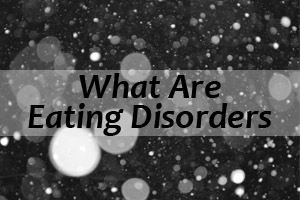What Are Eating Disorders

*** Disclaimer: The following article includes information derived from our clinical team’s impressions as specialized professionals working directly with Eating Disorders in Windsor/Essex County.
What is an Eating Disorder?
Eating disorders are complex mental health challenges. They often develop as an unhealthy way to cope with psychological and emotional distress. Eating disorders are typically characterized by ongoing disturbance of eating or eating-related behaviours, as well as distortions in self-evaluation on the basis of weight and shape. This behavior results in altered consumption or absorption of food that significantly impairs a person’s physical health, mental and emotional well being and every day functioning.
Some Characteristics of Eating Disorders
- Obsessive calorie counting and Dieting
- Dissatisfaction with your Body Shape
- Body shape avoidance, or excessive checking/fixing
- Binge eating
- Chronic loss of appetite
- Overvaluation of shape and weight
- Excessive exercising
- Strict dietary rules
- Dietary Rules * not related to a medical condition
- Delayed Eating
- Food Avoidance
- Chronic Grazing
- Purging* See BANA’s other blogs for more information on some of these behaviours
It is important to remember that only medical professionals (i.e. physicians and nurse practitioners), psychiatrists or psychologists can diagnose an eating disorder.
Engaging in one of these behaviours or occasionally struggling with dieting and body image does not necessarily mean that you meet the diagnostic criteria for an eating disorder. As a society, we are constantly flooded with messages from the prevailing diet culture around food and weight. This has contributed to an increase in disordered eating patterns for many people that aren’t necessarily grounds for a diagnosis.
However, it can be very easy to dismiss the early signs of an eating disorder by brushing it off as “just dieting”. Even if someone does not necessarily meet the criteria for a diagnosis, disordered eating and compensatory behaviours can still present with serious medical issues.
If you are concerned that you or someone you know may have an eating disorder, do not hesitate to contact your family doctor or make an appointment with BANA through our general intake line. We can meet with you to discuss potential symptoms, and can support you through some of your concerns.
Our general intake number is: 1-855-969-5530
Eating Disorder Diagnoses
There are several different kinds of Eating Disorder diagnoses; each has its own diagnostic criteria, features, risks and prognosis. The following diagnoses are outlined in the 5th edition Diagnostic Statistical Manual:
- Anorexia Nervosa
- Bulimia Nervosa
- Binge Eating Disorder
- Avoidant and Restrictive Food Intake Disorder
- Other Specified Feeding and Eating Disorders
*BANA works with all eating disorder diagnoses, most commonly (but not limited to) AN, BN and BED?
Who is at Risk?
While eating disorders can affect all kinds of people, there are some factors that can contribute to their development:
- Biological – your genetics and body’s biochemistry
- Psychological –personality traits (perfectionism, low self-esteem) and overall mental health
- Social – the cultural and familial norms that a person grows up with in regards to food, eating, dieting and body image; challenges with identity and self image; and a history of trauma
RESOURCES:
https://nedic.ca/eating-disorders-treatment/
https://dsm.psychiatryonline.org/doi/book/10.1176/appi.books.9780890425596